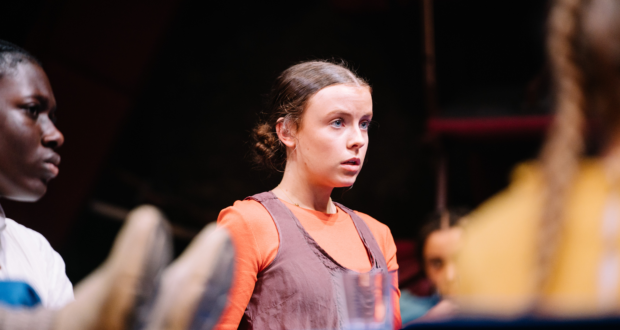Passionately thought-provoking narrative on intertwining societal and environmental issues. It begs the question of whether anyone, irrespective of generation, is truly innocent. Summary
Rating
Excellent
The Trials is set in an apocalyptic near future, where adults are tried in court, based on the harm they have caused to the environment and the potential wellbeing of future generations. Each defendant presents their case and it is then up to the jury of children – those most affected by past actions – to judge their guilt. Writer Dawn King swiftly showcases that the children of the future generation share many traits with ours, using a myriad of emotions, opposing opinions, and varying degrees of passion towards the cases.
The play follows a very structured format, starting with the defendants presenting their case, followed by a heated discussion/argument amongst the jurors and finish with a vote and verdict. While this provides the audience with time to familiarise themselves with the pacing of the production, the play could also be perceived as overstructured and lacking certain elements of surprise. Furthermore, several jurors’ view are already made up prior to the start of the trials; the same points are simply debated over and over, making their deliberation somewhat repetitive.
The jury is divided into three distinct subgroups: those hellbent on seeing the past generation punished; those that see the good in people; and those that refuse or are unable to make a judgement. Surprisingly, very few jurors go into each case with an open mind. Each juror largely maintains their stance throughout the three cases, remaining unswayed by the defendants’ arguments.
Honor Kneafsey as Ren gives a standout performance, displaying a range of emotions as the trials progress, starting with a heavy investment to ensure fairness, and then a noticeable, but justified withdrawal in the final case. On the other hand, Tomaz (Charlie Reid) does not care about the trials initially, following the majority to quickly end any discussions. Tomaz is happy to live in his imaginary world until the last trial, where the fate of the defendant could have a significant impact on the wellbeing of a member of the jury. Gabi (Jowana El-Daouk) has already made up her mind about all the defendants and is not swayed by any evidence put forward. While Noah (Joe Locke) starts off with the same mindset as Gabi, he is swayed by the last case, though the timing of this epiphany felt rushed and not fully justified.
The artistic choice to project black and white close-ups of defendants at the back of the stage could be a way to prominently display the discomfort and intensity of the situation. However, the Donmar is a relatively small theatre, and it is questionable whether this adds value when the facial expressions of each actor can already be seen in great detail. Equally, the rear of the stage resembles a makeshift barricade made up of chairs, seemingly serving as a climbing puzzle for Tomaz. It is perhaps not the most effective display for a courtroom, even in this chaotic world.
A minor note: twelve jurors are generally needed at the start of any criminal trial, which explains the number of children. Given the semblance to a real-world jury, which could allow a majority verdict of at least ten people in the absence of a unanimous verdict, it is surprising that this was not applied. Similarly, there is significant oversight in the selection of the jurors, including sufficient background checks and potential conflicts of interest.
As the story progresses, it becomes apparent that the adults are not the only ones judged, and the children are also judging each other based on past and current actions. Thus, one must question whether anyone, irrespective of generation, is truly innocent.
Written by: Dawn King
Directed by: Natalie Abrahami
Design by: Georgia Lowe
Lighting Design by: Jai Morjaria
Sound Design and Composition by: Xana
Movement Direction by: Anna Morrissey and Aaron Parsons
Video Design by: Nina Dunn
The Trials plays at Donmar Warehouse until 27 August 2022. Further information and bookings here.
 Everything Theatre Reviews, interviews and news for theatre lovers, London and beyond
Everything Theatre Reviews, interviews and news for theatre lovers, London and beyond



